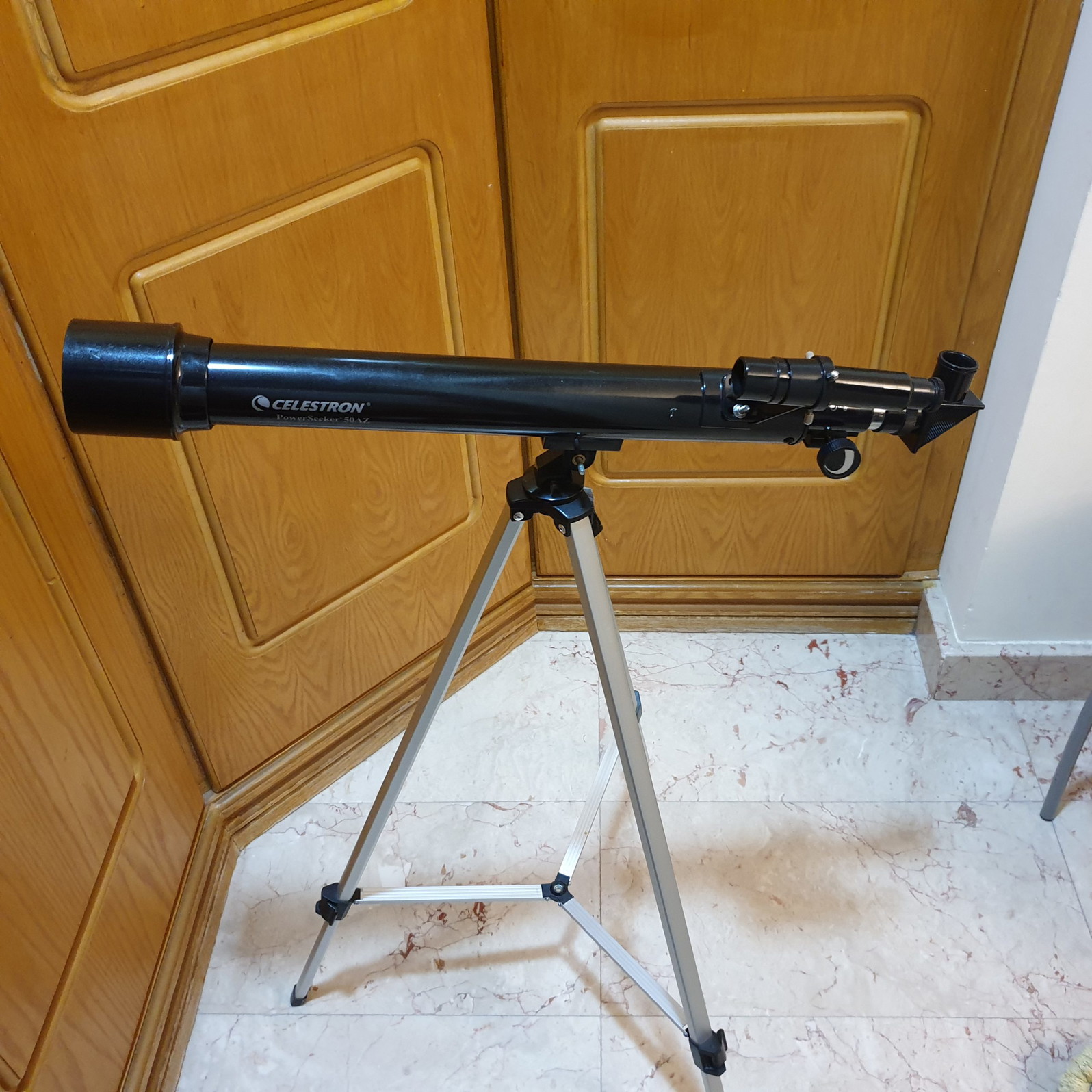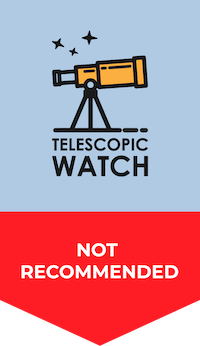The Optical Tube Overview
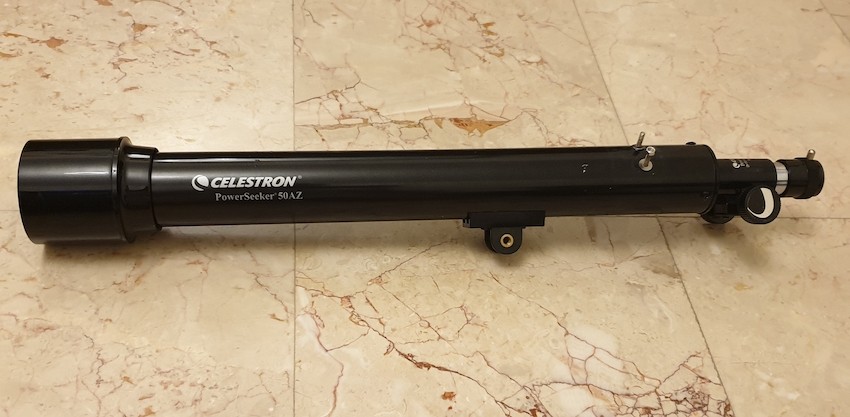
The Celestron PowerSeeker 50AZ is, as the name implies, a 50mm refractor with a focal length of 600mm and thus a focal ratio of f/12. The long f/12 focal ratio means that there is basically no chromatic aberration or false color, which we typically get on many larger refractors with low focal ratios.
While absolutely tiny, I discovered that the achromatic doublet objective lens is actually of high quality (glass, not plastic). But unfortunately, the base quality of the optics is almost entirely irrelevant because pretty much every other aspect of the scope is junk.
While the tube is metal, I’ve noticed that the dew shield and focuser on the 50AZ are entirely plastic. This material choice in itself is not a huge problem; plenty of good scopes use plastic, but the low-quality workmanship combined with it is.
The dew shield is shiny and thus causes glare and reflection issues, while the rack-and-pinion focuser is so poorly made that its teeth are easily broken. Additionally, the focuser is 0.965” format, which is no longer a size used by reputable telescope manufacturers. I’ve also learned that obtaining quality 0.965” accessories is rather difficult.
The Inexpensive Accessories
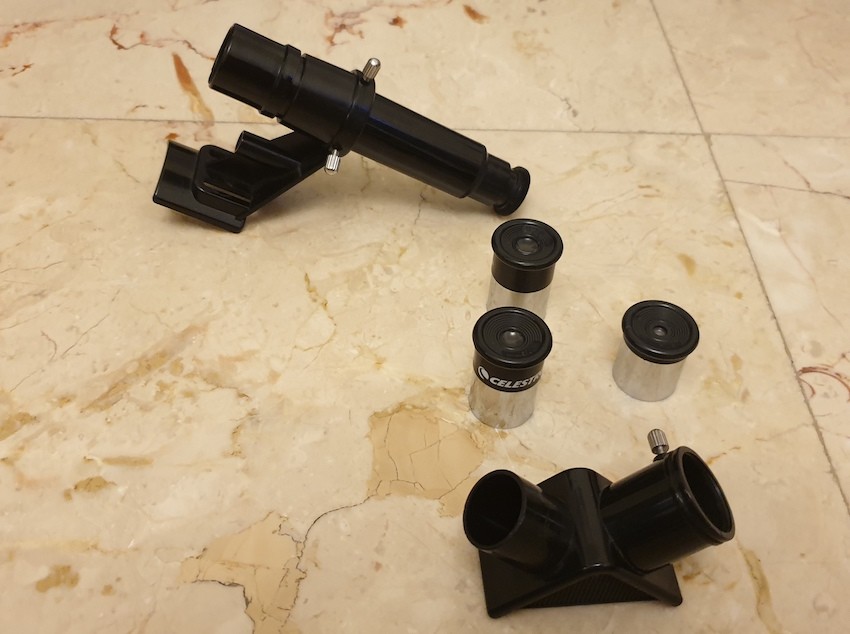
The Celestron PowerSeeker 50AZ comes with 4 eyepieces: 20mm, 14mm, and 4mm Huygens oculars (providing 30x, 50x, and 150x, respectively) and a 1.5x image-erecting eyepiece that flips the image right-side up. Along with that, the scope features a 3x Barlow lens and a 90-degree star diagonal to make viewing through the eyepiece more comfortable.
This may seem like a generous amount of accessories for your money, but don’t be fooled. I’ve realized that all of the accessories featured with the scope are made from cheap, low-quality plastic that completely bottlenecks the optical performance of the PowerSeeker.
The Huygens eyepieces have a very narrow field of view and tiny lenses that make the view feel like I’m looking through a drinking straw. The 4mm Huygens is actually too much magnification for the scope to physically handle. And, of course, the mount is so shaky that I’d be lucky to see anything at all with that high magnification.
The included barlow lens, in my experience, is absolutely unusable, being made entirely of plastic with extremely low optical quality. Oddly enough, the star diagonal is actually the worst of all—the mirror is nowhere near optically flat and significantly distorts the image.
All of these accessories are, of course, in the outdated 0.965” format. This severely limits accessory upgrades without the purchase of an expensive hybrid diagonal, which converts the scope to the more commonly used format of 1.25”. Getting a hybrid diagonal will cost nearly as much as the entire scope by itself, as will a quality 1.25” eyepiece or two.
The finderscope on the 50AZ—as with all the PowerSeekers—is a plastic-bodied, plastic lens 5×24 unit. Not only are the views through the finder quite dim and less-than-sharp, but the cheap bracket is poorly made and makes it somewhat difficult for me to align with the scope. However, while it is very poor quality, I actually believe that the 5×24 finder suffices for aiming the 50AZ—just barely.
Overall, the inexpensive accessories included with the telescope make the observing experience more difficult and frustrating for me than it should be. Replacing them—which would again require getting a hybrid diagonal and 1.25” eyepieces, as well as perhaps a better finderscope—costs several times more than what the scope is worth. I’d never do that.
A Garbage Mount
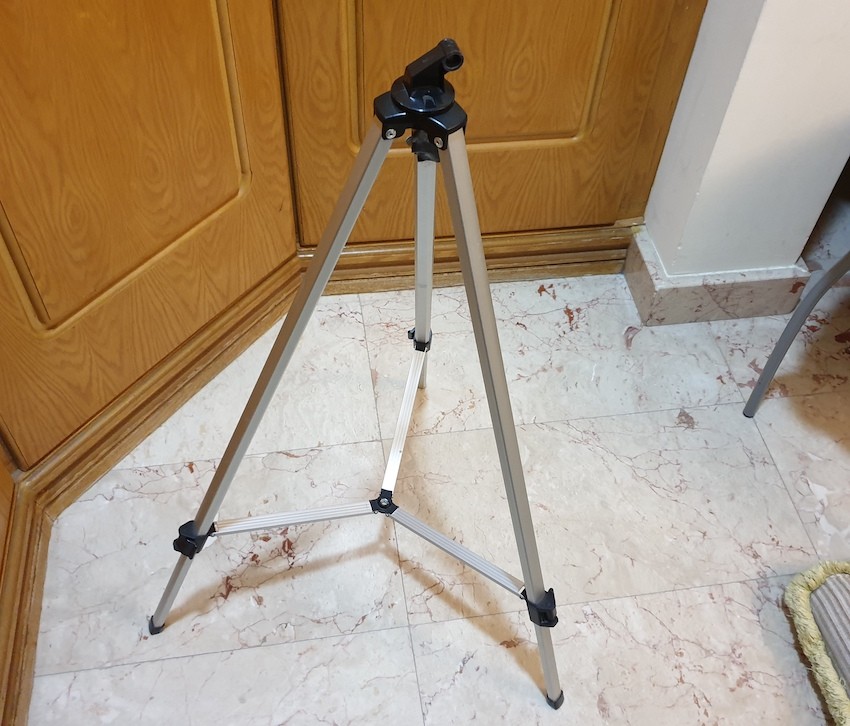
The mount included with the PowerSeeker is an absolute joke, probably one of the worst of any scope I’ve reviewed. The azimuth axis is nothing more than a washer, nut, and bolt, with no friction mechanism, gears, or slow motion controls to speak of. The altitude axis is not much better.
The Celestron PowerSeeker 50AZ’s tripod is manufactured from extremely thin aluminum tubing—so thin that a strong person can actually crumple the legs with their bare hands. It’s barely sturdy enough to support the insignificant weight of the optical tube.
On an ideal night with solid ground, it’s just stable enough to provide decent views if I keep the legs completely retracted. However, if I extend the tripod legs at all (or if the wind happens to be blowing), the legs will buckle and bend, and the view, even at low magnification, is a wobbly mess.
Aiming the telescope is also an exercise in frustration. The mount is either too loose and moves of its own accord right past my target or so stiff that it’s jerky and nearly impossible to get and keep it pointed at a target. The poor quality finder and Huygens eyepieces with the telescope itself don’t help me either.
Should I buy a used Celestron PowerSeeker 50AZ?
No.
Alternative Recommendations
If you’re looking for more suitable alternatives to the PowerSeeker 50AZ but have a budget of $100 or below, consider the following:
- The Zhumell Z100 has double the aperture of the 50AZ, sharp parabolic optics, a wide field of view, decent included accessories, and is incredibly easy to use with their tabletop Dobsonian mountings.
- The Celestron FirstScope doesn’t have the greatest optics, but it’s far easier to use than the 50AZ and comes with better accessories.
For finding more options, we recommend you check out our Telescope Ranking page.
Aftermarket Accessory Recommendations
By the time you’d have purchased better accessories, you would have spent multiple times more than the actual value of the Celestron PowerSeeker 50AZ, so it’s not worth bothering with upgrading anything. Save your money for a new telescope or a pair of binoculars.
What can you see with the Celestron PowerSeeker 50AZ?
Because of the fact that the scope is only 50mm (2”) in aperture, the amount of things I can observe with the 50AZ is very limited. The primary celestial objects I’m confined to are the moon, planets, and the very brightest deep-sky objects.
Not only does its small aperture limit what I can see, but also how well I can see it. Objects are far more dim and fuzzy in small-aperture scopes than they are in large ones.
I’m able to get some decent details on the moon and see Saturn’s rings, but that’s about it. Details on Mars, Jupiter, and Saturn, as well as Venus and Mercury’s phases, may be possible, but I don’t expect to see individual stars in globular clusters or the swirling dust lanes of the Andromeda Galaxy with this scope, as its resolving and light-gathering power are strictly limited by its small size. Even the Orion Nebula is relatively lackluster with a PowerSeeker 50AZ.

